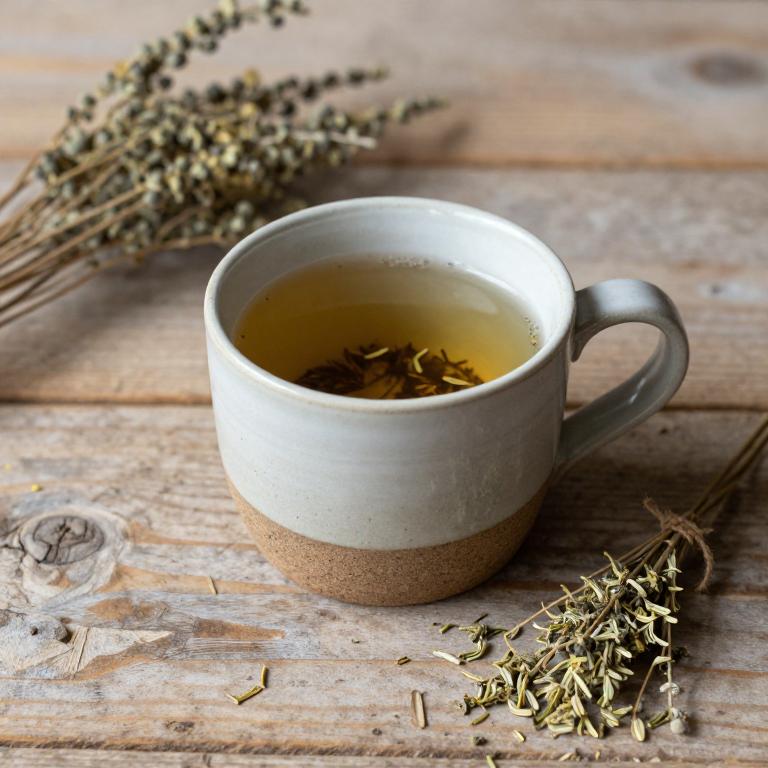10 Best Herbal Teas For Swollen Gums

Herbal teas can be a natural and soothing remedy for swollen gums, offering anti-inflammatory and antibacterial properties that help reduce irritation and infection.
Chamomile tea, known for its calming effects, is often recommended for its ability to ease gum inflammation and promote healing. Peppermint tea can also be beneficial due to its mild numbing effect and refreshing properties that help combat oral bacteria. Additionally, green tea contains antioxidants and catechins that may support gum health by reducing plaque and preventing gingivitis.
When used as part of a regular oral care routine, herbal teas can complement traditional dental hygiene practices and provide gentle relief for swollen gums.
Table of Contents
- 1. Salvia (Salvia officinalis)
- 2. Stinging nettle (Urtica dioica)
- 3. Echinacea (Echinacea purpurea)
- 4. St. john's wort (Hypericum perforatum)
- 5. Camellia (Camellia sinensis)
- 6. Yarrow (Achillea millefolium)
- 7. Rosemary (Rosmarinus officinalis)
- 8. German chamomile (Chamomilla recutita)
- 9. Licorice (Glycyrrhiza glabra)
- 10. Oregano (Origanum vulgare)
1. Salvia (Salvia officinalis)

Salvia officinalis, commonly known as sage, has been traditionally used for its anti-inflammatory and antimicrobial properties, making it a beneficial herb for herbal teas aimed at reducing swollen gums.
The essential oils in sage, such as thujone and camphor, help to soothe gum inflammation and reduce bacterial growth that can contribute to periodontal issues. When brewed into a tea, sage can be consumed orally or used as a mouth rinse to provide localized relief and promote oral health. Its astringent qualities may also help tighten gum tissues, offering additional support for gum recovery.
While sage tea is generally safe, it should be used with caution, especially during pregnancy or by individuals with certain medical conditions, and should not replace professional dental care.
2. Stinging nettle (Urtica dioica)

Urtica dioica, commonly known as stinging nettle, has been traditionally used in herbal medicine for its anti-inflammatory and astringent properties.
When brewed into a tea, it can help reduce swelling and discomfort in the gums due to its high content of minerals like iron, calcium, and silica. The tea works by soothing inflamed tissues and promoting healing through its natural antiseptic and detoxifying effects. To prepare the tea, fresh or dried stinging nettle leaves are steeped in hot water for several minutes.
While generally safe, it is important to consult a healthcare professional before using stinging nettle tea, especially for those with allergies or existing health conditions.
3. Echinacea (Echinacea purpurea)

Echinacea purpurea, commonly known as purple coneflower, is a popular herbal remedy often used in teas to support immune health and reduce inflammation.
When brewed into a tea, echinacea may help alleviate symptoms of swollen gums by reducing bacterial activity and promoting healing. Its anti-inflammatory and antimicrobial properties are believed to contribute to its effectiveness in oral health care. However, while some studies suggest potential benefits, more research is needed to confirm its efficacy for specific gum conditions.
As with any herbal remedy, it is advisable to consult a healthcare professional before using echinacea, especially if you have existing health conditions or are taking other medications.
4. St. john's wort (Hypericum perforatum)

Hypericum perforatum, commonly known as St. John's wort, is a herbal remedy that has been traditionally used for its anti-inflammatory and antimicrobial properties.
When brewed into a tea, it may help reduce inflammation and swelling in the gums, making it a potential natural remedy for gum issues. The active compounds in St. John's wort, such as hypericin and hyperforin, are believed to contribute to its healing effects on oral tissues. However, it is important to consult with a healthcare provider before using this herb, especially if taking other medications, due to potential interactions.
While some studies suggest its benefits, more research is needed to fully understand its efficacy for treating swollen gums.
5. Camellia (Camellia sinensis)

Camellia sinensis, the plant from which green and black teas are derived, contains bioactive compounds like catechins and polyphenols that may help reduce inflammation and promote oral health.
These compounds have antioxidant and anti-inflammatory properties that can potentially alleviate symptoms of swollen gums by reducing bacterial growth and oxidative stress in the mouth. Some herbal teas made from Camellia sinensis may also contain additional ingredients like mint or licorice root, which can further soothe gum irritation. While not a substitute for professional dental care, regular consumption of Camellia sinensis-based teas may support overall gum health when used as part of a holistic oral hygiene routine.
However, individual responses may vary, and it is advisable to consult a healthcare provider before using these teas for persistent or severe gum issues.
6. Yarrow (Achillea millefolium)

Achillea millefolium, commonly known as yarrow, has been traditionally used in herbal medicine for its anti-inflammatory and astringent properties, making it a potential remedy for swollen gums.
When brewed into a herbal tea, yarrow can help reduce gum inflammation and soothe irritation due to its high content of volatile oils and flavonoids. The tea works by promoting circulation and reducing bacterial buildup, which are common causes of gum swelling. To prepare the tea, steep one teaspoon of dried yarrow in hot water for several minutes, and drink it up to three times daily.
However, it is advisable to consult with a healthcare provider before using yarrow tea, especially if you are pregnant, nursing, or taking other medications.
7. Rosemary (Rosmarinus officinalis)

Rosmarinus officinalis, commonly known as rosemary, is a popular herb used in herbal teas to support gum health.
Rosemary tea contains anti-inflammatory and antimicrobial properties that can help reduce swelling and infection in gums. The essential oils in rosemary, such as cineole, contribute to its ability to soothe inflamed tissues and promote healing. Drinking rosemary tea regularly may help alleviate symptoms of gingivitis and prevent further gum irritation.
However, it is best used as a complementary therapy alongside proper oral hygiene and professional dental care.
8. German chamomile (Chamomilla recutita)

Chamomilla recutita, commonly known as German chamomile, is a popular herbal tea used for its anti-inflammatory and soothing properties.
When brewed as a tea, it can help reduce swelling and irritation in the gums due to its high content of antioxidants and essential oils. The mild, calming effect of chamomile tea makes it a gentle option for those seeking natural relief from gum inflammation. It is often recommended for individuals experiencing mild gingivitis or post-extraction swelling.
However, while it can be a helpful complementary remedy, it should not replace professional dental care for more serious gum issues.
9. Licorice (Glycyrrhiza glabra)

Glycyrrhiza glabra, commonly known as licorice root, has been traditionally used in herbal medicine for its anti-inflammatory and soothing properties.
When brewed into a tea, it can help reduce inflammation and irritation in the gums, making it beneficial for those experiencing swollen gums. The active compounds in licorice root, such as glycyrrhizin and flavonoids, work to calm gum tissues and may help prevent bacterial growth. However, excessive consumption of licorice root tea can lead to side effects like high blood pressure due to its potassium-depleting effect.
It is advisable to consult a healthcare professional before using licorice root tea, especially for prolonged periods or in combination with other medications.
10. Oregano (Origanum vulgare)

Origanum vulgare, commonly known as oregano, is a versatile herb that has been traditionally used for its anti-inflammatory and antimicrobial properties.
When brewed into a herbal tea, oregano can help reduce inflammation and soothe irritated gums, making it a natural remedy for swollen gums. The essential oils in oregano, particularly carvacrol and thymol, contribute to its ability to combat bacteria that may contribute to gum infections. To prepare the tea, a few fresh or dried leaves can be steeped in hot water for several minutes.
Regular consumption of oregano tea may support overall oral health and provide relief from the discomfort associated with gum inflammation.